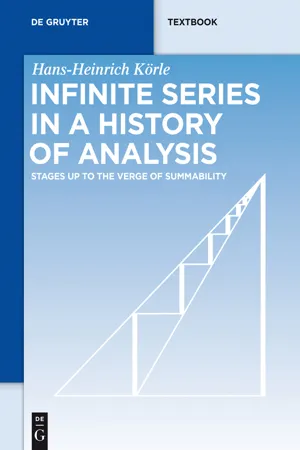![]()
1The Greek era: Speculation, ideas and the comet of rigor
1.1Infinity, challenging Greek philosophers
Eternity, infinity. Sort of ciphers to label some-“thing” which is grounded in sentiment rather than sense. I feel ill at ease to think a procedure without end, halving no easier to imagine than is doubling. A bit like the sensation of vertigo that hits me when, walking under a starry night, I am haunted by the question why matter should exist at all.
Whenever man enjoyed the spare time to think beyond physical survival, his mind started wondering, longing for apprehension. Some of his species would not rest content with irrational answers. To us, the home of rational thought was ancient Greece. Her early thinkers would ask how things might, and could at all, happen in space and time. They were known as sophists, men of wisdom.
One in high repute was Zeno (Zenon) of Elea.{1a, 2a} The negative connotation of today’s sophism is due to people subsequent to him who, purposefully or not, set traps for the human mind and found caught themselves. Zeno wanted to make his countrymen think, when he made Achilles race a tortoise with a head start.{2b} He did not ask when Achilles would close up to it, but whether. No he said, never.
This is why{1b, 3a}: Both start at t0 o’clock. Achilles starts from P0 and reaches, at t1, the starting position P1 of the tortoise who then had gained P2; Achilles gets to P2 by the time t2, and so on and on. The time scale t0 < t1 < t2 < … never ends, so what about the time of race? Zeno presumably was facing this paradox: Infinitely many periods need be added up – to whatever else but to infinity!? So, what is time if it refutes thought? The sophist touched infinite series and their problems. It took more than two millenniums for an answer and Grégoire de Saint-Vincent{1c, 2c, 3b} with another kind of thought. He found out that the periods tn+1 − tn, n = 0,1, … , form a geometric series{2d, 3c} the convergence of which he visualized similarly as shows the book’s cover (see 1.3). Sophistication at its best when this contemporary of de Fermat resolved the Greek’s riddle by a mathematical model! (The answer was questioned by a certain Sir{4}; see Appx. A-1.)
Facing the time required to cover a distance, Zeno presumably would have had to deny any move to be possible. Would he?{1d} How could an arrow fly when standing still every moment?{2e} Motion was visible, yet not thinkable. He was not the only “Zeno”. The Greeks, yes, a whole people’s mind set up. Eventually, their men of wisdom saw but one way out: Achilles would fail on account of the presumption that time and space could be subdivided open end.{2f}
Partition was made a point by another philosopher when Greek geometry began to measure its objects. Democritus (Demokritos){5a} had the idea that all matter is composed by indivisibles, “atoms” in Greek. Did he think of the material world only? The objects of ideal geometry, ought they not be partitioned as ever one wants? In fact, geometrical atoms were discussed seriously. Democritus was about to imagine a cone to be made up of layers parallel to the bottom; if those layers of atoms have or have no thickness, either assumption wouldn’t work.{5b} Is there something in between? To fill the gap, philosophers would resort to qualities like infinitely flat or slim or short – without being nothing! It meant an indivisible to own some dummy volume or area or length capable to create something proper. Really a dummy solution, just words. Yes? Though being absurd and questioned by Democritus himself{5b}, the idea did lead to correct conclusions, thus turning out two-edged. The pros and cons also startled Aristotle (Aristoteles).{3c} It was the infinite small rather than its big brother that kept philosophers busy.
Aristotle would admit to the endless process so as to substantiate a potential infinite. However, later on at least, he definitely refuted the actual existence of an infinite aggregate like “the entity” formed by all the numbers 1,2, … , called an actual infinite{6}. It would apply to infinitely small elements in geometry; by his own geometrical argument{3c}, Aristotle disproved the line elements of his time.
Modern analysis will bring togethe...
